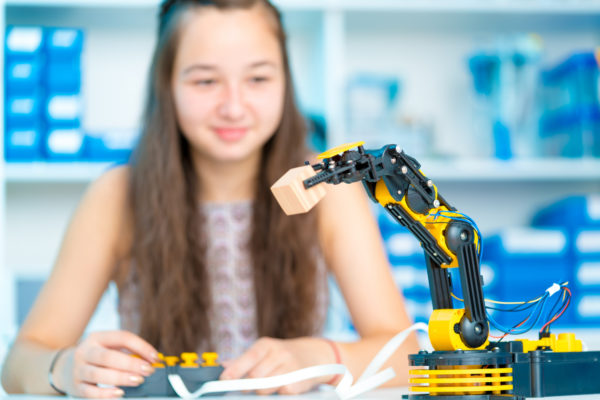Tesha Frederick sees the endless possibilities of teaching science, thanks to a University of Wyoming (UW) program that promotes STEM careers.
Frederick, a kindergarten-first-grade teacher, was among 30 teachers – -mainly from various Wyoming school districts — on the UW campus this summer for a 10-day schedule that included various STEM-related workshops.
In its first year, the program, called RAMPED (for robotics, applied mathematics, physics and engineering design), is planned as a three-year, federally funded Wyoming Department of Education Math and Science Partnership grant program, according to Andrea Burrows, UW College of Education secondary education science assistant professor, who led the program.
The program was originally developed when leaders and teachers from the Natrona County School District created a strategic plan to boost graduation rates. They worked with UW instructors in developing the RAMPED program.
Next page: How the program helps teachers build STEM skills to pass on to students
Burrows says the focus of the program is to support teachers on student achievement in STEM fields. RAMPED is a professional development program in which at least 25 teachers each year experience a 10-day, on-campus summer institute and six days of intensive follow-up training in Casper.
“RAMPED provides teachers professional development to enable six active-learning projects revolving around robotics, applied mathematics, physics and engineering design,” Burrows says.
Teacher participants worked directly with physicists, astronomers, mathematicians, computer scientists, and computer engineers in advanced laboratories, using cutting-edge computer facilities on the UW campus.
Frederick says she enjoyed the collaboration and presentation of “cutting-edge” science topics that RAMPED offered, and how all that “can be and should be incorporated into cross-curricular activities.”
“I had a similar experience last year with a session provided by Dr. Burrows,” Frederick said. “Last year’s topic was all about astronomy, so I am excited to share, with my students, things I learned then to prepare them for the excitement of the solar eclipse that is coming to our area next August.”
But, more important, she adds that the RAMPED program helped her gain insights to the endless possibilities of teaching science.
“I was able to get materials on loan to enhance my teaching and the students’ learning when budgets are being cut,” Frederick said. “The program’s staff also lends itself as a continual resource for teachers and how to effectively teach to the Next Generation Science Standards.”
At UW, first-week workshops included the use of Raspberry Pi, a computer on a card that is similar to an Intel processor; arduino, a computer that has inputs and outputs; and working with Baxter, a robot. The second-week workshops of RAMPED focused on space, using data from the Sloan Digital Space Survey, as well as virtual reality and NetLogo, and a workshop titled “Naturally Inspired.”
The six follow-up sessions, to be held later in the academic year, feature the same content with ideas for teachers to use as classroom extensions and elaborations, Burrows says.
Even though the program targeted the Natrona County district’s needs, Burrows says RAMPED’s ideals also can be used in other school districts.
“RAMPED provides the same mathematics, physics and engineering content, and instruction so that any teacher can ask and answer questions — using research and inquiry — and then incorporate this same technique and content into their classroom structure,” she added.
Frederick says the program will be beneficial in her own classroom.
“I believe I am better able to give my students a foundation for how to learn science by questioning and responding and investigating,” she said. “And, there is never just one answer.”
Burrows led the RAMPED program along with UW’s Bob Kubichek, electrical and computer engineering associate professor, and session leader for arduinos; Adam Myers, physics and astronomy associate professor, and session leader for space; Suresh Muknahallipatna, electrical and computer engineering professor, and raspberry pi session leader; and Mance Hurley, NCSD Academy coach in the Pathways Innovation Center.
The teachers’ work, including created lesson plans and posters, as well as session materials, is available online.
- Friday 5: Blended learning - May 10, 2024
- Cybersecurity is top priority for K-12 edtech leaders - May 8, 2024
- New group targets AI skills in education and the workforce - May 6, 2024

